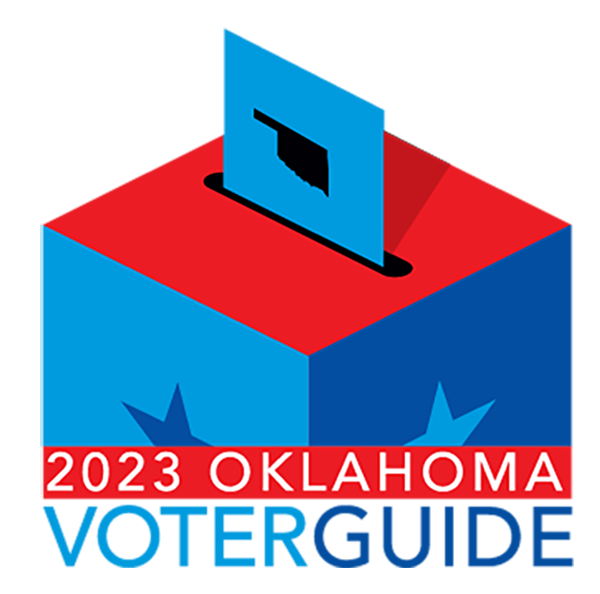2023 Oklahoma Voter Guide
STATE QUESTION 820

BALLOT TITLE
This measure creates a state law legalizing recreational use marijuana for persons 21 or older. Marijuana use and possession remain crimes under federal law. The export of marijuana from Oklahoma is prohibited. The law will have a fiscal impact on the State. The Oklahoma Tax Commission will collect a 15% excise tax on recreational use sales, above applicable sales taxes. Excise tax revenues will fund implementation of the law, with any surplus revenues going to public school programs to address substance abuse and improve student retention (30%), the General Revenue Fund (30%), drug addiction treatment programs (20%), courts (10%), and local governments (10%). The law limits certain marijuana-related conduct and establishes quantity limits, safety standards, restrictions, and penalties for violations. A local government may prohibit or restrict recreational marijuana use on the property of the local government and regulate the time, place, and manner of the operation of marijuana businesses within its boundaries. However, a local government may not limit the number of, or completely prohibit, such businesses. Persons who occupy, own, or control private property may prohibit or regulate marijuana-related conduct, except that a lease agreement may not prohibit a tenant from lawfully possessing and consuming marijuana by means other than smoking. The law does not affect an employer’s ability to restrict employee marijuana use. For the first two years, marijuana business licenses are available only to existing licensees in operation one year or more. The law does not affect the rights of medical marijuana patients or licensees. The law requires resentencing, reversing, modifying, and expunging certain prior marijuana-related judgments and sentences unless the State proves an unreasonable risk to a person. The Oklahoma Medical Marijuana Authority is authorized to administer and enforce the law.
Shall the proposal be approved?
For the proposal – YES
Against the proposal – NO
SUMMARY
State Question 820 would establish a state law that allows adults aged 21 and over to use and grow marijuana legally for recreational purposes, within limits. The state’s medical marijuana laws would remain intact. As of February 2023, marijuana was still illegal under federal law.
The proposal allows an adult to possess, buy, consume, or transport up to one ounce of marijuana, eight grams in concentrated form, and/or eight grams contained in concentrated form in marijuana products. An adult could possess or cultivate up to six mature marijuana plants and six seedlings as long as those are kept at home and not visible to the public. No more than 12 plants and 12 seedlings could be kept at one residence.
It would remain illegal to:
- provide marijuana to someone under 21
- operate a vehicle under the influence of marijuana
- possess or consume the drug at a school, prison, or jail
- smoke or vape marijuana in a public place
Employers could prohibit use of marijuana by employees on the job. Governments, businesses, and property owners could ban or restrict it on their premises. A lease agreement, however, could not ban tenants from possessing marijuana or consuming it, except by smoking. Cities or counties could regulate cannabis businesses but not limit or prohibit them. For the first two years, only medical marijuana businesses licensed for at least a year could sell recreational marijuana.
SQ 820 would decriminalize marijuana under state law but is still categorized as a Schedule 1 drug and is illegal at the federal level. People previously convicted of a marijuana-related crime — who would have faced no conviction or lesser charges if the new law had been in effect at the time of their conviction — can petition the court for a lesser sentence. Those petitions include re-sentencing, reversal of the conviction, dismissal of the case or charges, or, if the sentence is completed, expungement or redesignation as a civil infraction. Any outstanding fines or court costs would be waived. If the state objects, a hearing would be held and the state would bear the burden of proof.
Penalties for violating the law are civil fines ranging from $25 to $250, depending on the offense, and possible drug education.
SQ 820 would impose a 15 percent state excise tax on sales of recreational marijuana to consumers, on top of state and local sales taxes. The excise-tax funds would be used first to pay costs for the Oklahoma Medical Marijuana Authority. For any remaining funds, 10 percent would go to cities and counties, 10 percent to the State Judicial Revolving Fund, 30 percent to the general revenue fund, 30 percent to public schools for substance abuse programs and student retention, and 20 percent to agencies or nonprofits to fight drug addiction.
BOTH SIDES
Proponents Say
* Too many Oklahomans have faced unjust arrest and incarceration for simple marijuana offenses; some are saddled with a lifelong criminal record. The law includes provisions for pursuing expungement of criminal records and vacating low-level marijuana convictions. This would allow law enforcement to focus on more serious crimes.
* SQ 820 takes a sensible, balanced approach, limiting use and possession of recreational marijuana to adults, and restricting amounts and public visibility, while promoting personal freedom and a fairer justice system.
* As of February, 21 states and Washington D.C. have legalized recreational marijuana. Oklahoma’s law, which the state legislature could amend, draws from lessons learned in other states over the past decade.
* The Oklahoma Medical Marijuana Authority has become more effective and can regulate both medical and recreational marijuana. It will enforce standards, limits on marketing and seed-to-sale tracking.
* The 15 percent excise tax is more than double the 7 percent for medical marijuana and will generate substantial revenue, potentially bolstering state services, public schools, nonprofits that fight substance abuse, city and county governments and the court system. In 2021, state and local governments collected $149 million in medical-marijuana excise and/or sales taxes.
* SQ 820 restricts grounds for probable cause searches by prohibiting the smell of marijuana as the basis for a search.
Opponents Say
* Oklahoma has failed to adequately regulate medical marijuana, allowing too many dispensaries and illegal growing operations. Recreational marijuana will worsen or prolong the problems.
* Penalties for violating the law are weak and will result in a lack of enforcement and widespread noncompliance.
* Marijuana has grown more potent over decades. SQ 820 is unhealthful for a state with high rates of substance abuse.
* This law puts underage children at risk through access in their homes and exposure to second-hand smoke from marijuana.
* A commercialized marijuana industry will exploit workers for profit and turn a blind eye to increased use of marijuana by teenagers.
* Revenue from marijuana taxes represents only a tiny fraction of Oklahoma’s state budget – not enough to offset the steep costs in mental health, lost productivity and environmental problems.
FOR MORE INFORMATION
https://www.sos.ok.gov/documents/questions/820.pdf
https://oklahoma.gov/omma/about/about-omma.html
https://okpolicy.org/state-question-820-recreational-marijuana-legalization-initiative/
https://ballotpedia.org/Oklahoma_State_Question_820,_Marijuana_Legalization_Initiative_(March_2023)
©2023 OKVOTERGUIDE


